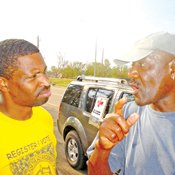Jet-Setters No More?
On Friday, the House passed a bill that could put a state jet up for sale on eBay. Citing the "true conservative" example of Sarah Palin, Appropriations Committee Chairman Johnny Stringer, D-Montrose, said that selling the jet would make fiscal sense and send the right message about government's priorities during a recession. He estimated that the jet costs the state $1,900 per hour to use.
House Bill 1065 would require the state to sell its eight-seat Cessna Citation jet, which elected officials use for in-state and out-of-state travel. The bill allows for sale by competitive sealed bids, public auction or online auction. Stringer said that the plane is valued at $3.7 million. If the House bill clears the Senate and the governor's office, the state will still have three other taxpayer-funded planes.
Some Republicans objected to the bill, saying that funds from the federal stimulus package would make the sale unnecessary. John Moore, R-Brandon, tried to kill the measure by proposing an amendment that would have required the sale of every state-owned plane, including those used by the state's universities and colleges.
The House voted down Moore's amendment and passed the bill by a vote of 78 to 42.
Taxin' Jackson
With the Feb. 3 committee deadline for general bills bearing down, the House Ways & Means Committee approved a bill on Tuesday that could help Jackson make up for the revenue it loses from hosting the state's government business. House Bill 1622 would allow Jackson to enact a special 1 percent sales tax, subject to 60 percent approval on a city-wide referendum. The tax, which would exempt groceries, hotels and motels, restaurants and prescription drugs, could generate between $20 million and $36 million for the city every year. The bill would require the city to spend that money on public safety, infrastructure and economic development.
Jackson's legislative delegation has long called for the state to supplement the city's property tax revenue, which is limited by the amount of non-taxable state-owned property within the city limits.
Sen. John Horhn, D-Jackson, said last week that state-owned property strains the city's infrastructure and public safety services without contributing to its coffers. "Only about one in three employees of the state lives in the capital city," Horhn said. "So there's a great burden that's placed on the city by these services for the capital complex and state government."
Stan Flint, a lobbyist for the city, said that hosting state government costs Jackson around $14 million every year.
"It is a huge step forward for the city," Flint said. "The citizens will see a major impact if this passes."
Horhn sponsored a different bill that would have diverted more existing sales tax revenue to the city. That bill will not make it out of committee, Horhn said Tuesday. The House bill, which would not take any revenue from the state, would be more successful, though, he said.
"That may have better legs than the diversion bill," Horhn said.
The Senate is currently drafting a version of the House bill, he added. House lawmakers may debate the bill as early as Wednesday, Feb. 4.
Early Voting, Voter ID Compromise
An election reform bill that cleared the House Apportionment & Elections Committee on Tuesday seeks bipartisan support by pairing early voting accommodations with a voter ID requirement.
"I have long believed when Mississippians begin to trust each other, we will have meaningful voter reform in our State," Secretary of State and voter ID supporter Delbert Hosemann said in a statement Tuesday. "Today's committee vote was a step in that direction."
House Bill 1533 provides for early voting beginning 30 days before Election Day and allows same-day voter registration, measures supported by Democrats and voting rights groups. The bill appeases the predominantly Republican supporters of voter ID, though, with a requirement that voters present some proof of identity at their polling place. A number of forms of ID are acceptable under the bill, including utility bills and paychecks, along with driver's licenses and hunting licenses.
Opponents of voter ID argue that the requirements could intimidate and effectively disenfranchise older African American voters who remember poll taxes and other attempts to discourage black voters. In an attempt to address those concerns, the bill exempts those born before Aug. 6, 1944, from the ID requirement.
Derrick Johnson, president of the Mississippi NAACP, said Tuesday that the bill's ID requirements were still unnecessary.
"We remain opposed to any voter ID," Johnson said. "There's no evidence of voter fraud in Mississippi that would justify voter ID.



Comments
Use the comment form below to begin a discussion about this content.